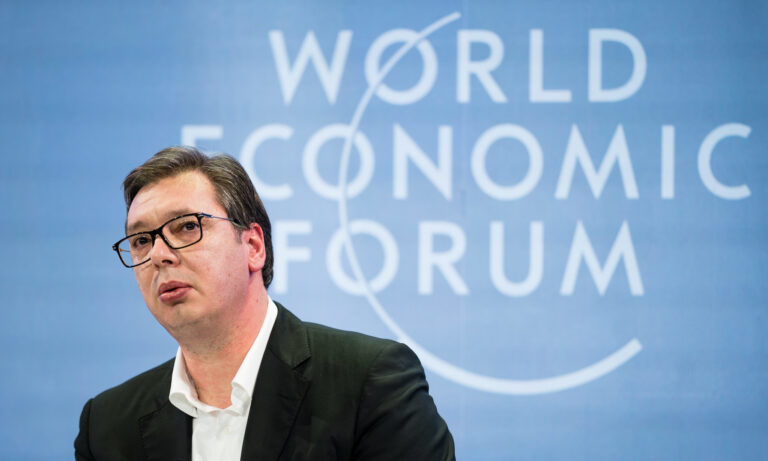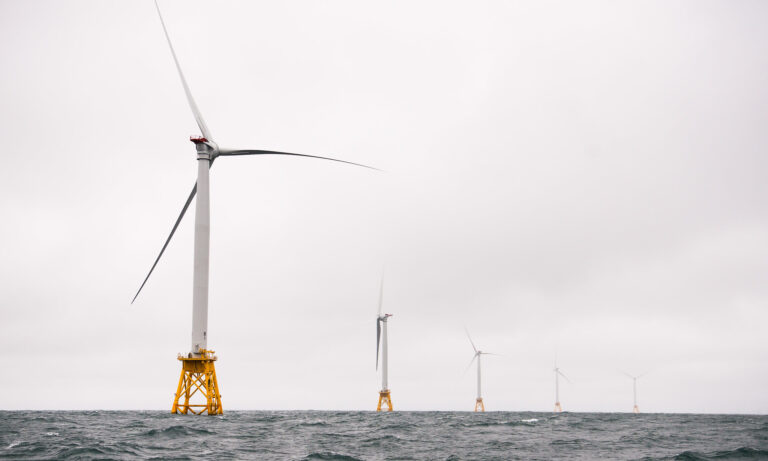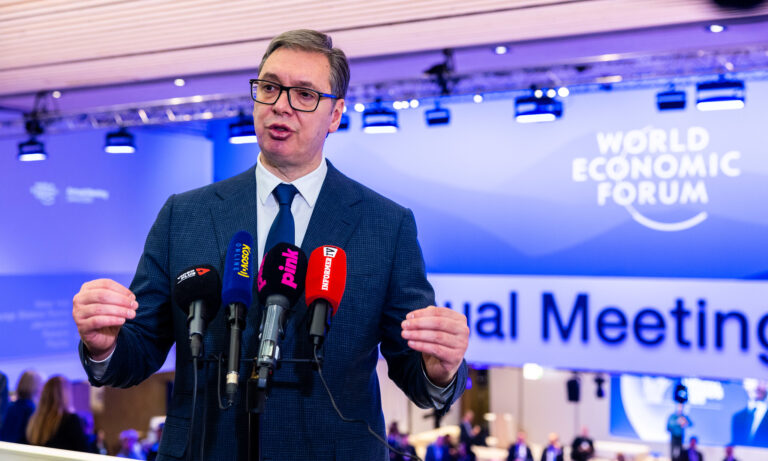
The visit of the Chinese leader to Belgrade made it clear that Serbia is going all in on cooperation with China.
A Royal Treatment
As one of the three stops on Xi Jinping’s first visit to Europe in five years, Serbia was the safe choice for the Chinese president. While it was expected that the Chinese leader, along with his delegation, would be welcomed with the highest diplomatic honors, the reception itself and the results of the visits have exceeded expectations.
On May 5, two days before the arrival of the Chinese delegation, the first glimpses of how Belgrade would look during the visit appeared. A large Chinese flag was unfurled on the Genex building, also known as the Eastern Gate of Belgrade. This was just the beginning of the preparations, which culminated in Belgrade being thoroughly decorated with Chinese and Serbian flags, Chinese writings on banners covering buildings, and a ceremonial arrival.
Late in the evening on May 7, Xi Jinping was welcomed by Serbian President Aleksandar Vučić at the Belgrade Airport, accompanied by the highest-level Serbian delegation. The Chinese delegation included 400 people, including Foreign Minister Wang Yi. Stringent security measures were undertaken for the visit.
The date of arrival was quite symbolic in itself, marking the 25th anniversary of the NATO bombing of the Chinese embassy in Belgrade during the intervention in Yugoslavia. While it was expected that the date and the three victims of the bombing would be commemorated in a more significant manner, including a possible visit by the Chinese president to the newly built Chinese cultural center which includes a memorial plaque dedicated to the journalists killed in the bombing, this did not happen. However, the story of the bombing still resonated significantly throughout the visit.
On the same day as Xi Jinping’s arrival, the Serbian daily newspaper Politika published an article signed by the Chinese leader, stating, “The Chinese people cherish peace, but we will never allow such a tragic history to repeat itself. The China-Serbia friendship, forged with the blood of our compatriots, will stay in the shared memory of the Chinese and Serbian peoples and will inspire us to march forward with big strides.”
The working part of the meeting started with a ceremonial arrival during which Xi Jinping and Aleksandar Vučić were greeted by thousands of people in front of the Palace of Serbia. The ceremony was carefully choreographed, and the only one who addressed the crowd was the Serbian President. During his speech, Vučić said to Xi that “as a leader and president of a great power, he will be respected everywhere in the world, but he will not find such respect and such love anywhere like here, in our Serbia,”
Deals Galore
Two official meetings were held in Belgrade: one between the two presidents and another between the Serbian and Chinese delegations. Before the two presidents addressed the media, a total of 28 agreements were signed. These agreements included cooperation in space research and development and five agreements between Serbian and Chinese media. Several deals were dedicated to the operationalization of the Free Trade Agreement between the two countries. But the most important agreement, and the one that gave reason to look at the visit as “historic” (as claimed by the Serbian side), was the one signed by the two presidents themselves, pledging to “build a shared future.”
The agreement on a Shared Future brings an upgrade of the Sino-Serbian relationship to a “Community of Shared Future,” moving beyond the comprehensive strategic partnership established eight years ago. Serbia became the first European nation to submit to the Chinese concept. During their meeting, Xi Jinping and Serbian President Aleksandar Vučić emphasized “the enduring friendship between the two countries,” citing “historical roots, a solid political foundation, extensive common interests, and strong popular support.” They noted significant progress in bilateral relations in recent years, particularly since the establishment of the comprehensive strategic partnership in 2016, which has served as a “model for China’s relations with other European countries.”
In the attempt to understand what is the Chinese Communist Party’s (CCP) view on the concept of the Community of Shared Future, one can refer to the white paper published in September 2023. This paper defines the initiative as a one to “pursue openness, inclusiveness, mutual benefit, equity, and justice. The goal is not to replace one system or civilization with another. Instead, it is about countries with different social systems, ideologies, histories, cultures, and levels of development coming together to promote shared interests, shared rights, and shared responsibilities in global affairs.” In effect, the Community of Shared Future is the latest step in the development of a Chinese vision of international affairs that seeks to undermine the leading position of the US-led West and of liberal democracy as a universal model of governance.
The statements coming from both presidents have been in line with the notion that the partnership has surpassed the business level of cooperation. Leaders have highlighted the alignment on the issues of territorial integrity, supporting each other on this crucial issue for both sides.
Another important aspect of the visit was the operationalization of the free trade agreement that is set to take effect on July 1 this year and showcasing its potential. According to the announcements, the first products that will try to position Serbia as a relevant player on the Chinese markets are blueberries and dried plums.
Xi Jinping urged China and Serbia to continue their practical cooperation, highlighting the outcomes of their Belt and Road cooperation. He emphasized the importance of advancing cooperation in traditional areas such as transportation and energy infrastructure, including completing the Belgrade-Budapest railway project, but also initiating more “small and beautiful livelihood projects” with local impact. This was further detailed within six specific aspects of the next steps of cooperation.
The Chinese leader stated that the bilateral partnership will further focus on deepening cultural and people-to-people exchanges, calling for “making innovation cooperation a new growth driver in the bilateral relationship,” particularly in artificial intelligence. As a part of these efforts, 300 young Serbians and 50 Serbian scientists will be invited to conduct study and research exchanges in China. Lastly, in an attempt to highlight Xi Jinping’s and CCP’s ideological approach to the newly established level of diplomatic relationship, the Chinese leader called for joint opposition to “hegemonism, power politics, bloc politics, and camp confrontation, urging adherence to the UN Charter’s principles and genuine multilateralism to promote international fairness and justice.”
Serbia’s Bet on China
While the developments and results of the visit may be described as historical by the Serbian political leadership, they have also opened new questions. One regards the implications of Serbia signing up to the Community of the Shared Future. The level of political alignment between Belgrade and Beijing has already been high. How will Serbia contribute to the establishment of a new global governing system that China and the CCP seek to lead under their vision of “justice and fairness” remains to be seen.
This is especially important in the context of Serbia’s path towards European Union membership. An ever-closer political alignment with China on the global stage will certainly not bring forward the proclaimed goal of EU accession. The US Special Envoy for the Western Balkans, Gabriel Escobar, noted that Xi Jinping’s visit to Belgrade had the goal of creating distance between Serbia and the West, and this is indeed the main signal coming out of the trip. Creating more headaches for the Western decision-makers, Xi’s visit to Hungary, contrary to Serbia both a NATO and EU member, had a very similar message.
No matter the criticism, Serbia and its political leadership will persist in developing a relationship with China which so far has been predominantly positive for them. China has been supporting Serbia when it comes to critically important political questions like the issue of territorial integrity. China will not put additional pressure on Serbia to impose new rules, standards, and regulations, which is the predisposition of the EU accession process. China will not lead efforts within the multilateral platforms, which will be seen as having a damaging impact on the image of Serbia. And finally, Western countries will continue to be seen as antagonists who make conditions and ultimatums, while China and its leader Xi Jinping, to paraphrase the Serbian president, will be not only respected but loved like nowhere else. How Vučić’s bet on China will play out for the country remains to be seen, but one thing is clear – Serbia is going all in.
Written by
Stefan Vladisavljev
vladisavljev_sStefan Vladisavljev is CHOICE Visiting Fellow. He is also the Program Coordinator of the Serbia-based non-governmental organization Foundation BFPE for a Responsible Society. He analyzes Chinese presence in Central and Eastern Europe with a special focus on Serbia and the Western Balkans.


